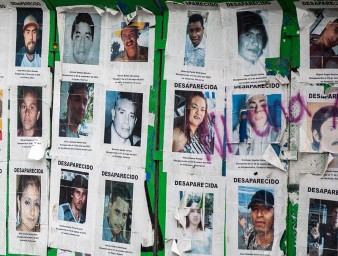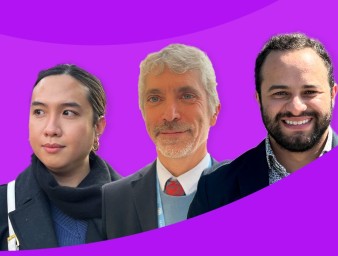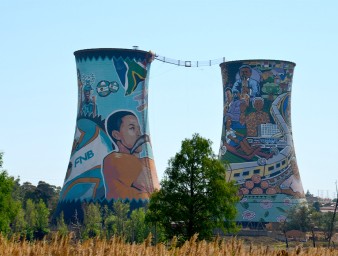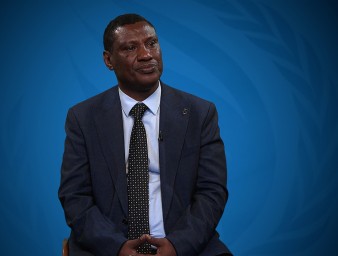Training helps groups to fight for equality
23 November 2022
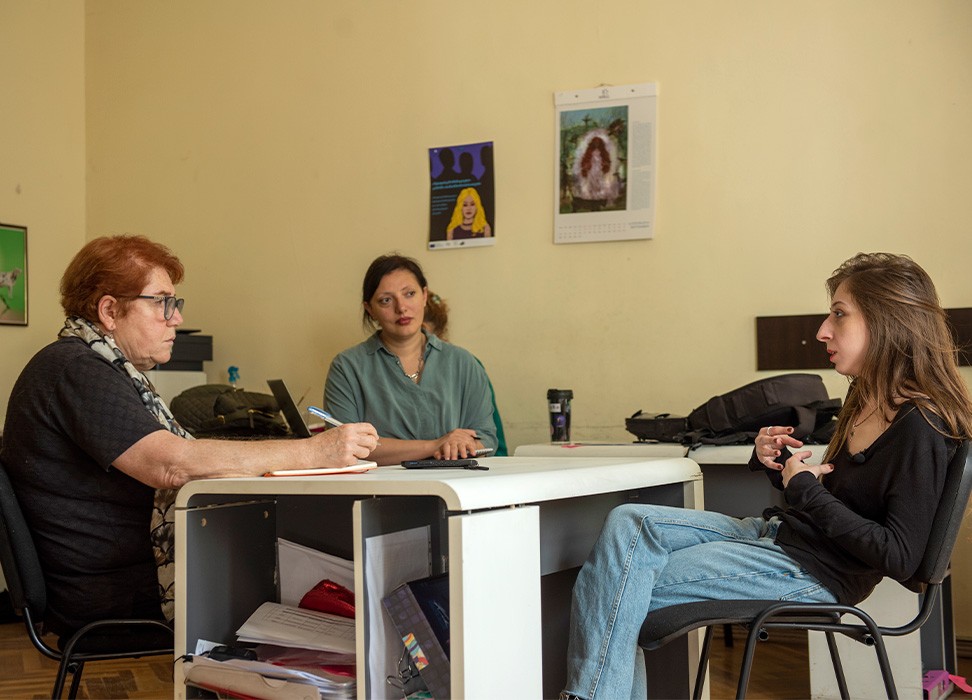
The comfortable community centre sits on a hilly, tree-lined street, in one of the capital’s many residential areas. There is no sign on the door: you will need to be given the exact address if you want to drop by.
Visitors are requested not to disclose the location, and to make sure no identifying signs appear in photographs.
“WISG has been operating on the DO NO HARM principle for ten years now. Safety of community members is of utmost importance for us, so we have no logo outside, no rainbow flag, nothing,” said Elene Kaikhosroshvili, an advocate with the Women’s Initiatives Supporting Group (WISG). LGBTQI stands for Lesbian, Gay, Bisexual, Transgender, Queer, and Intersex.
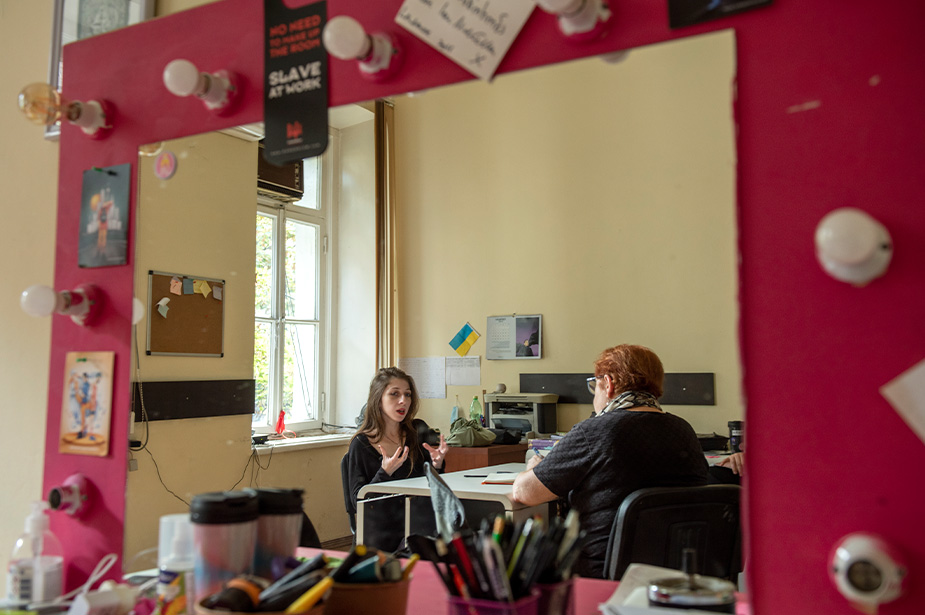
Lika Gulbani of TEMIDA, discusses the groups work. Gulbani was one of the participants in a recent human rights workshop held by UN Human Rights. © Gela Bedianashvili/OHCHR
This kind of discretion is common in a country where social mores regarding sexual orientation are still difficult to change and where violence against non-heterosexuals and activists is relatively common and often unpunished.
A land of tradition
While there are plenty of liberal currents in Georgia, this is a land laden with tradition. The Georgian Orthodox church is strong and has been active since the sixth century. The State failure that followed the fall of the Soviet Union allowed churches to fill the vacuum. They provided much-needed charitable and health services and in Georgia. The church became identified with the struggle for independence.
Reinforcing this traditionalism are well-funded ultra-conservative and far-right groups with anti-gay and anti-gender agendas, helping slow the pace of change.
Tbilisi scheduled its first march in favour of LGBTQI equality in 2012, but street fighting broke out, along with assaults by religious counter-demonstrators. Each time a similar event has been planned, results have been disruption, violence, or even cancellation. In 2021, a broad political coalition signed an anti-discrimination agreement, and it appeared that a peaceful event might finally take place.
The announcement of the agreement was quickly followed by calls from conservative quarters to cancel what they called “anti-Christian” and “anti-Georgian” events. Despite support from Western governments and NGOs, organizers were forced to drop their plans after offices were ransacked, flags burned, and riots broke out across Tbilisi, injuring some 50 journalists covering the violence.
A robust legal framework
Georgia is not without legal recourse against discrimination. On the contrary, it has a solid anti-discrimination legal framework that should prevent violence and hate crimes against members of the LGBTQI community.
The principle of equality is enshrined in the Constitution, although not explicitly, but a later constitutional court ruling prohibited discrimination on the grounds of sexual orientation and gender identity. The Labour Code also prohibits such discrimination, as does the Criminal Code, and the Law on Broadcasting bans programmes that discriminate.
“
This is the aim of our work. We are trying to change the fabric of society, one step at a time.
“
Vladimir Shkolnikov, Senior Human Rights Advisor with the South Caucasus office of UN Human Rights
As a result of a visit to Georgia in 2018, the United Nations Independent Expert on protection against violence and discrimination based on sexual orientation and gender identity concluded that “systemic factors deny lesbian, gay, bisexual, trans and gender diverse persons the right to live free and equal in Georgia,” and that they “must conceal their identity if they want to be recognized as citizens respectful of mores and values qualified as ‘good’.”
“Those convictions are fuelled and reinforced by agents of the church, tolerated and at times sponsored by politicians, governmental and law enforcement agents, and replicated by mass and social media,” the report added.
This was reinforced four years later by a February 2022 report in which the Commissioner for Human Rights of the Council of Europe stated that “LGBTI people remain affected by instances of hate crimes and pervasive discrimination in the fields of education, work, healthcare, and social services and they experience serious challenges in safely exercising their right to peaceful assembly and association.” According to the report, this was compounded by a failure to hold perpetrators to account.
“It is a difficult situation when even people within high echelons of power make homophobic statements,” said Vladimir Shkolnikov, Senior Human Rights Advisor with the South Caucasus office of UN High Commissioner for Human Rights. “But human rights change is not instant. We need to be persistent and continue our efforts. Conventions and treaties are empty words if people do not act on them.”
“This is the aim of our work,” Shkolnikov said, “We are trying to change the fabric of society, one step at a time.”
Strengthening civil society
In response to threats to freedoms, Georgia has developed a vibrant civil society and part of the work of UN Human Rights involves making sure groups have the tools they need to move the anti-discrimination needle forward.
Some of these tools involve knowledge of how to achieve redress against discrimination. While national courts can be useful, bringing cases to the attention of international human rights bodies can be tremendously effective and act as a multiplier.
“Advocacy at the local level is not always effective,” said Lika Gulbani of TEMIDA, a queer association in Tbilisi. “If there is international pressure from the UN, that might be more effective.”
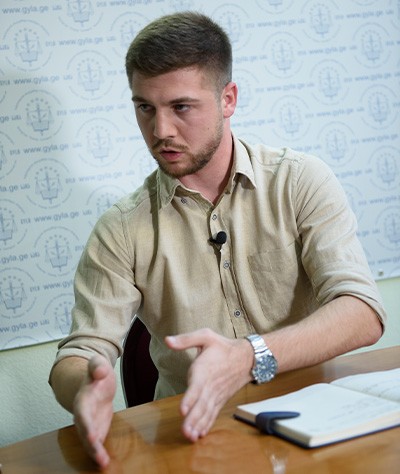
David Javakhishvili is an international litigation lawyer with the Georgian Young Lawyer’s Association. © Gela Bedianashvili/OHCHR
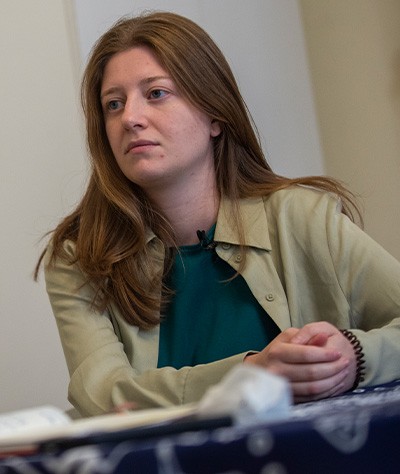
Elene Kaikhosroshvili is an advocate for the Women’s Initiatives Supporting Group (WISG). © Gela Bedianashvili/OHCHR
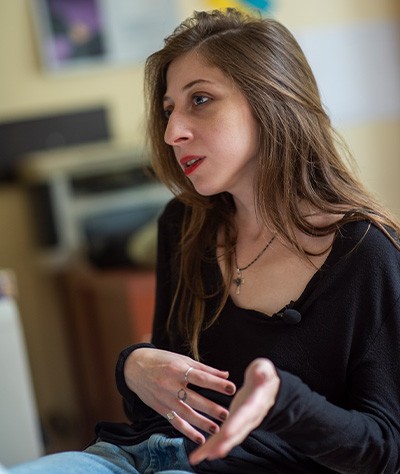
Lika Gulbani of TEMIDA, an LGBTQI association based in Tiblisi, Georgia, attended the workshop. © Gela Bedianashvili/OHCHR
Other community groups agree.
“UN Human Rights plays a very important role for us,” said Kaikhosroshvili of WISG. “We don’t have a huge grassroots movement so there is not that much intense pressure from the ground. This is why outside pressure is so important to us.”
Using potential pressure through international mechanisms and bodies was a key topic developed during a recent workshop by UN Human Rights and the UN Development Programme to build the capacity of non-governmental organizations (NGOs).
“We have learned such important skills as preparing shadow reports for UN mechanisms and disseminating knowledge,” said Gulbani, who attended the workshop. “We won’t see the results in a day or two as this is a long-term effort, but we have hope.”
David Javakhishvili, an international litigation lawyer with the Georgian Young Lawyers’ Association (GYLA), said learning how to use the conventions to fight discrimination was a revelation.
“We learned how special procedures of UN treaty bodies can be used to defend human rights, and how one case can be used to move another forward,” he said. “We also learned how to use international conventions to promote human rights – we know there are conventions, but we also need to know how to use them.”
No overnight change
Most of those who work for human rights in Georgia concur: change will not happen overnight.
But they also share a vision – that of hope, and of knowing things will get better.
“We did a recent survey and found that many stereotypes around gender had changed over five years,” said Kaikhosroshvili. “The change was especially tangible around young urban women, and attitude towards the transgender community seems to have shifted the most.”
Georgia is in the process of developing a human rights strategy and action plan that defenders of human rights hope will attenuate some of the existing social discrimination and impunity and strengthen the implementation of existing laws.
